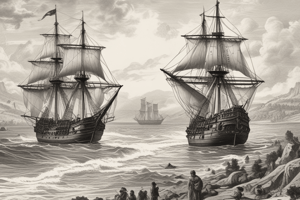Podcast
Questions and Answers
What is a key skill that students must master in historical analysis?
What is a key skill that students must master in historical analysis?
- Critical thinking (correct)
- Reading comprehension
- Basic arithmetic skills
- Memorization of dates and names
Which type of sources provides firsthand accounts of historical events?
Which type of sources provides firsthand accounts of historical events?
- Fictional stories
- Primary sources (correct)
- Textbooks
- Historical documentaries
Why is understanding context important in historical analysis?
Why is understanding context important in historical analysis?
- To memorize more historical facts
- To improve scientific knowledge
- To appreciate the complexity of historical circumstances (correct)
- To develop language skills
What does developing empathy toward people in the past entail?
What does developing empathy toward people in the past entail?
Why is it important to evaluate multiple interpretations of historical events?
Why is it important to evaluate multiple interpretations of historical events?
Flashcards are hidden until you start studying
Study Notes
Social Studies and History
Social studies is a broad discipline that encompasses various fields of study focused on human behavior and society. One significant aspect within social studies is history, which examines past events and their effects in order to understand how societies change over time. Here's a deeper look into this important connection between social studies and history.
Understanding History within Social Studies
History forms a critical component of social studies curricula because it provides context and insight into current practices, behaviors, and beliefs by studying past societal interactions. By exploring historical events and their causes and consequences, students can develop essential skills such as critical thinking, problem solving, and effective communication while also gaining a broader understanding of the world around them.
In teaching history through social studies, educators often emphasize the connections between different fields, including economics, politics, culture, and geography. This approach allows students to see how these interconnected disciplines shape our world today. For instance, studying the economic policies that led to the rise of industrialization in the late 19th century in Britain can help students understand why certain countries have particular economic systems today. Similarly, learning about the origins of democracy in ancient Greece can illuminate contemporary political structures and processes.
Key Concepts in Historical Analysis
Historical analysis, a core skill taught within social studies, includes several key concepts that students must master to effectively make sense of and relate to past events:
- Critical Thinking: Students need to evaluate sources of information, identify patterns and trends, formulate hypotheses, draw conclusions from evidence, and communicate their findings in a clear and logical manner.
- Analysis of Primary Sources: Analyzing primary sources—such as letters, diaries, photographs, maps, speeches, newspapers, etc.—provides firsthand accounts of historical events, helping students gain a more nuanced understanding of the past.
- Understanding Context: Recognizing the cultural, social, economic, political, and geographical factors that influenced events helps students appreciate the complexity of historical circumstances.
- Empathy and Perspective Taking: Developing empathy toward people in the past requires imagining their thoughts, emotions, hopes, fears, and experiences, which can lead to a better understanding of the motivations behind decisions or actions taken during specific periods.
- Evaluation of Multiple Interpretations: History rarely offers a single, universally accepted interpretation. Learning to critically assess multiple interpretations of events fosters openness to new ideas and perspectives.
Integrating History with Other Subject Areas
Integrating history with other subjects enhances student engagement and deepens comprehension beyond mere memorization of dates and names. Some examples include:
- Math: Studying historical data sets like population growth rates or changes in agriculture productivity can illustrate mathematical principles while providing real-world context.
- Language Arts: Exploring historical documents, literature, and artifacts can improve vocabulary, reading comprehension, and writing skills.
- Science: Investigating technological advancements throughout history sheds light on scientific discoveries and innovations.
Challenges and Opportunities
As with any subject area, there are challenges in integrating history into social studies, such as balancing content coverage with meaningful analysis and critical thinking, managing diverse student backgrounds and interests, and addressing misconceptions or biases present in historical narratives. However, when executed well, the integration of history into social studies can offer numerous opportunities, including cultivating curiosity, developing empathy, promoting civic responsibility, and instilling a deeper appreciation for the complexities of human existence.
Studying That Suits You
Use AI to generate personalized quizzes and flashcards to suit your learning preferences.




